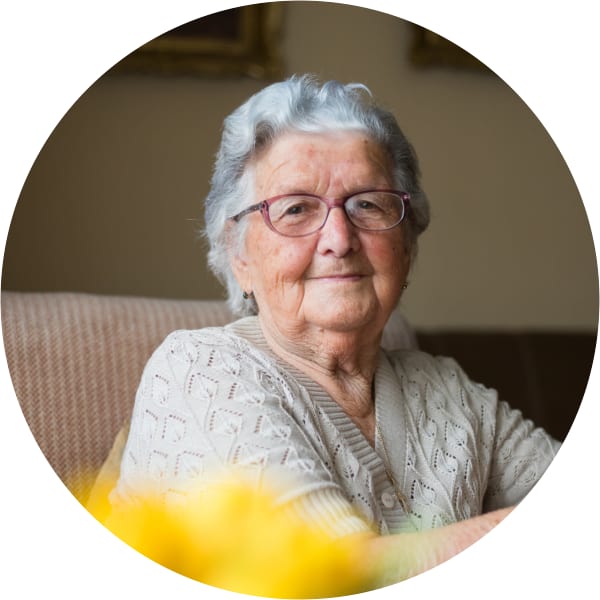Just like the cost of any home. Some communities require an up-front buy-in while others ask residents to sign a simple monthly lease.
Where to Start: How to Pick The Right Option?
Our team at Oxford Senior Living is here to guide you through each step of the next chapter in life. Our calling is to help you and your loved one stay safe, live well and thrive. Understanding some of the differences between senior housing options will help you find a starting point. The first step is determining the appropriate level of care you need – or want.
Use this guide to help you find the right starting point.

Independent Living
Independent Living is essentially any type of apartment or patio home that has been designed to cater to seniors’ needs. These homes typically offer maintenance-free living and may have access to services that include housekeeping, meals, maintenance and activities geared toward seniors. Neighbors grow into fast friends as they regularly gather for games, outings, parties and fitness without having to rely on outside transportation. You can truly remain independent. A new trend in Independent Living offers apartments for active seniors with a la carte pricing, essentially making the social and safety benefits of senior communities available to a much wider audience than the all-inclusive resorts with heftier price tags.
Independent Living can be ideal for seniors who struggle with home maintenance; those who need a more accessible home; seniors hoping to downsize; or those who want to avoid social isolationism and depression.
Start looking as early as age 55, with the understanding that quality of life can be greatly impacted with the built-in social atmosphere in Independent Living communities. Downsizing to an active senior apartment in your 60s or 70s can help you to stay active longer – improving your overall health and extending quality of life. Active senior communities can remain a great fit for decades.
Be sure you understand how your lease or buy-in will be impacted if you move out. Will you need to sell your patio home? Is there a chance you would lose money if you choose to move in the future? Can you easily transition to Assisted Living if you need that later?

Assisted Living
Assisted Living can offer the independence of apartment living with the added comfort of on-site health care including medication management and assistance with Activities of Daily Living like dressing, bathing and eating. On-site dining, housekeeping and laundry are standard also. Assisted Living communities work closely with families and health care providers to determine the appropriate level of care for each new resident. Most Assisted Living communities also offer an array of social activities that help seniors stay mentally and physically active with classes, contests and outings throughout each week. Additional amenities and quality dining in these communities can also prompt more family time with Grandma if the extended family enjoys coming to visit and participate in community events.
range based on the type of apartment as well as the level of care needed. A free assessment will give you a clear picture of your complete costs before any contract is signed.
Assisted Living can be ideal for seniors who struggle with nutrition, medication management, dressing and bathing; or those who need additional health monitoring while still retaining independence.
Take a look around your loved one’s home. Is it easy for Mom and Dad to get from room to room? Is the fridge or pantry well-stocked? Are they able to keep up with housework on their own? Many seniors struggle to maintain their home and their own health and nutrition on their own. If transportation is an issue, your loved one may not be able to purchase needed groceries and medications without assistance, and social isolation can set in.
Introduce yourself to some of the caregivers at communities you are considering. These individuals will be working closely with you and your loved one. How do they make you feel? Beyond customer service, caregivers in an Assisted Living setting may begin to feel like family to the seniors they care for.

Memory Care
Memory Care offers 24-hour care for individuals with Alzheimer’s or other types of dementia. Memory Care communities include many of the benefits of Assisted Living, like medication management and assistance with personal care. More importantly, Memory Care communities are fully secure to help ensure the safety of residents who wander, and care staff in these communities typically receive special training to help them understand how best to communicate with dementia residents. Seniors who live with Alzheimer’s and dementia may have difficulty physically and emotionally, but a secure environment with specially trained staff can help those seniors retain quality of life and give their adult children peace of mind. These communities may also offer family support through caregiver support groups that help family members cope with the difficulties of grieving the loss of a living parent. According to the latest statistics released by the Alzheimer’s Association, deaths from Alzheimer’s disease have increased by 145% since 2000 with an increase in the total population who develop Alzheimer’s every day. With the need for Memory Care communities on the rise, many have a wait list.
for Memory Care start higher than Assisted Living because residents with advanced dementia need 24-hour care.
Memory Care communities are designed for seniors who have been diagnosed with a form of dementia.
When a senior is no longer safe in their current environment OR that senior would benefit from having a memory care environment with specially trained staff, it is time for 24-hour memory care. NOTE: Waiting too long to move into a Memory Care setting can be very dangerous because it can be difficult to determine whether your loved one is able to avoid life-threatening situations on their own. Consult an area memory care community for a free assessment. Many families access resources at Memory Care communities for respite care if they need assistance caring for their loved one for a short time. A respite stay may help you determine if now is the right time for Memory Care.
Look for an active daily life enrichment program. Vibrant daily activities can prolong the most active time of a dementia resident’s life and help families stay connected.

Skilled Nursing
Skilled Nursing, often referred to as nursing homes, offer 24-hour care in a more clinical setting. Patients who are recovering from an injury or illness may stay in Skilled Nursing or rehabilitation hospitals for a limited time. In 2010, the US Census found that only 3% of seniors live in skilled nursing settings. Rather than moving to a Skilled Nursing setting, most seniors enlist support through home health or assisted living communities.
can be based on the type and duration of care you need, the provider you use, and where you live.
In nearly all cases, a health care professional will guide you to the need for Skilled Nursing due to injury or illness.
If you hope to transition from Skilled Nursing to an Assisted Living community, the Assisted Living community can be a great resource for you. Begin talking to them early.
Breaking Down the Costs
While a few senior housing options fit the average social security benefit, the majority of us will want or need senior care that costs hundreds or thousands more each month. As with nearly any industry, you get what you pay for. If you or your parents are in need of a much higher level of care, your cost will be higher than that of a person who is able to walk, eat and dress themselves without assistance. So plan on spending more depending on how much one-on-one care you or your loved one will need.
Long-term Care Insurance policies can be a big asset, but they are not the only option to afford the lifestyle you need or want. Many veterans and their spouses qualify for Aid & Attendance benefits that help pay for assisted living, memory care and skilled nursing. And in some cases, life insurance policies or mortgages can be leveraged.

About Oxford Senior Living
Oxford Senior Living has developed, managed and innovated within the senior living industry for more than a decade. Our experiences, and our hearts, have taught us well that success is defined by the genuine care and respect that we extend to the senior community and their families. For us, that care and respect is intrinsic to who we are. Welcome home to Oxford Senior Living!
Love Where You Work
Working in the senior living industry takes a special person. At Oxford Senior Living, we create a culture for our team members that celebrates the joy of serving others and creating meaningful relationships. We strive everyday to create an environment where employees feel valued, heard, and respected. Learn more about our company culture.
Links
Get In Touch





 Email
Email Follow The Adventures
Follow The Adventures Google
Google Linkedin
Linkedin